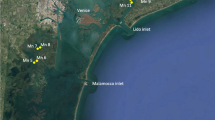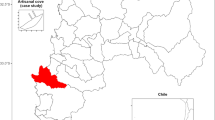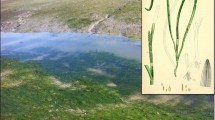Abstract
Approaches towards the management of artisanal fisheries have been enlightening the scientific literature for approximately the last 20 years. Coming from diverse disciplines such as anthropology, biology, economy, and ecology (especially human ecology), these approaches have dealt with common theory, strategies for cooperation, decision-making models, cultural contexts, and local knowledge. Fishery management depends on an understanding of the interactions between humans and aquatic resources, and in case of indigenous or of native populations, forestry resources are also considered for livelihoods. Acquiring an understanding of the local knowledge about fish and other resources, of collective local arrangements and institutions, of market interactions, and of the decision-making processes of fishers is fundamental for the management of artisanal fisheries. This review includes historical and current approaches associated with the management of artisanal fisheries. These approaches include the following: (a) cultural and human ecological approaches, including ecological models such as optimal foraging theory; (b) institutional approaches, including processes of cooperation associated with local knowledge and institutions; and (c) current ecological-economic propositions towards fishery management, such as payments for environmental services. This revision is illustrated through examples, in particular, of data collected among coastal artisanal fisheries of the SE Atlantic Forest in Brazil.




Similar content being viewed by others
Notes
For information and overall debate on such demands as well analysis on green economy, I suggest to consult the ISEE Conference Proceedings on http://www.isee2012.org/anais/ (Ecological Economics and Rio +20: challenges and contributions for a green economy, Rio de Janeiro, Brazil, June 16–19, 2012).
References
Acheson, J. M. (1981). Anthropology of fishing. Annual Review of Anthropology, 10, 275–316.
Acheson, J. M. (2003). Capturing the commons. Lebanon, USA: University Press of New England.
Acheson, J. M., & Knight, J. (2000). Distribution of fights, coordination games, and lobster management. Comparative Studies on Society and History, 42, 209–238.
Axelrod, R. (1984). The evolution of cooperation. New York: Basic Books.
Axelrod, R. (1997). The complexity of cooperation. Princeton: Princeton University Press.
Axelrod, R., & Cohen, M. D. (2000). Harnessing complexity. New York: Basic Books (kindle edition, Amazon.com).
Begossi, A. (1992). Food taboos at Búzios Island (Brazil): Their significance and relation to folk medicine. Journal of Ethnobiology, 12, 117–139.
Begossi, A. (1993). Ecologia humana: um enfoque das relações homem-ambiente. Interciência, 18(3), 121–132.
Begossi, A. (1995). Fishing spots and sea tenure in Atlantic Forest coastal communities: Incipient forms of local management. Human Ecology, 23(3), 387–406.
Begossi, A. (1996a). The fishers and buyers from Búzios Island (Brazil): Kin ties and production. Ciência e Cultura, 48(3), 142–147.
Begossi, A. (1996b). Fishing activities and strategies at Búzios Island (Brazil). In R. M. Meyer, C. Zhang, M. L. Windsor, B. J. McCay, L. J. Hushak, & R. M. Muth (Eds.), Proceedings of the world fisheries congress, Theme 2, (pp. 125–141), Athens, May 1992. Calcutta, India: Oxford & IBH Publishing CO. PVT. LTD.
Begossi, A. (1998). Property rights for fisheries at different scales: Applications for conservation in Brazil. Fisheries Research, 34, 269–278.
Begossi, A. (2006). The ethnoecology of Caiçara metapopulations (Atlantic Forest, Brazil): Ecological concepts and questions. Journal of Ethnobiology and Ethnomedicine, 2, 40. www.ethnobiomed.com/content/2/1/40) (Online).
Begossi, A. (2008). Local knowledge and training towards management. Environment, Development and Sustainability, 10, 591–603.
Begossi, A. (2010). Small-scale fisheries in Latin America: Management models and challenges. MAST, 9(2), 7–31.
Begossi, A. (2011). O cerco flutuante e os caiçaras do litoral norte de SP, com ênfase a pesca de Trindade. RJ. Interciência, 36(11), 803–807.
Begossi, A., & Richerson, P. J. (1992). The animal diet of families from Buzios island: An optimal foraging approach. Journal of Human Ecology, 3(2), 433–458.
Begossi, A., & Silvano, R. A. M. (2008). Ecology and ethnoecology of dusky grouper (Epinephelusmarginatus (Lowe, 1834)) along the coast of Brazil. Journal of Ethnobiology and Ethnomedicine, 4. www.ethnobiomed.com/content/4/1/20) (Online).
Begossi, A., Leitão-Filho, H. F., & Richerson, P. J. (1993). Plant uses at Búzios Island (SE Brazil). Journal of Ethnobiology, 13(2), 233–256.
Begossi, A., Hanazaki, N., & Ramos, R. (2004). Food chain and the reasons for food taboos in the Amazon and in the Atlantic Forest coast. Ecological Applications, 14(5), 1334–1343.
Begossi, A., Lopes, P. F., Oliveira, L. E. C., & Nakano, H. (2010). Ecologia de Pescadores da Baia da Ilha Grande. São Carlos: Ed. RIMA.
Begossi, A., May, P. H., Lopes, P. F., Oliveira, L. E. C., Vinha, V., & Silvano, R. A. M. (2011a). Compensation of environmental services from artisanal fisheries in SE Brazil. Ecological Economics, 71, 25–32.
Begossi, A., Salivonchyk, S. V., Araujo, L., Andreoli, T. B., Clauzet, M., Martinelli, C. M., et al. (2011b). Ethnobiology of snappers (Lutjanidae): Target species and suggestions for management. Journal of Ethnobiology and Ethnomedicine, 7, 11. http://www.ethnobiomed.com/content/7/1/11 (Online).
Begossi, A., Lopes, P., & Silvano, R. (2012a). Co-management of reef fisheries of the snapper-grouper complex in a human ecological context in Brazil. In G. H. Kruse, H. I. Browman, K. L. Cochrane, D. Evans, G. S. Jamieson, P. A. Livingston, et al. (Eds.), Global progress in ecosystem-based fisheries management (pp. 353–373). Fairbanks: Alaska Sea Grant, University of Alaska. doi:10.4027/gpebfm.2012.018 (Online).
Begossi, A., Salivonchyk, S. V., Lopes, P., Nora, V., Silvano, R. A. M. (2012b). The Paraty artisanal fishery (southeastern Brazilian coast): Ethnoecology and management of a social-ecological system (SES). Journal of Ethnobiology and Ethnomedicine, 8, 22. http://www.ethnobiomed.com/content/8/1/22.
Berkes, F. (2008). Sacred ecology. New York: Routledge.
Berkes, F. (2010). Shifting perspectives on resource management: Resilience and the reconceptualization of ‘Natural Resources’ and ‘Management’. MAST, 9(1), 13–40.
Bernardes, L. M. C., & Bernardes, N. (1950). A pesca no litoral do Rio de Janeiro. Revista Brasileira de Geografia, 2–53.
Bloch, M. (1983). Marxism and anthropology. Oxford: Oxford University Press.
Boyd, R., & Richerson, P. J. (1985). Culture as an evolutionary process. Chicago: University of Chicago Press.
Boyd, R., Richerson, P. J., & Henrich, J. (2011). Rapid cultural adaptation can facilitate the evolution of large-scale cooperation. Behavioral Ecology and Sociobiology, 65, 431–444.
Brosnan, S. F., Salwiczek, L., & Bshary, R. (2010). The interplay of cognition and cooperation. Philosophical Transactions of the Royal Society B, 365, 2699–2710.
Camargo, E., & Begossi, A. (2006). Os diários de campo da Ilha dos Búzios. São Paulo: Ed. HUCITEC.
Cavalli-Sforza, L. L., & Feldman, M. W. (1981). Cultural transmission and evolution. Princeton: Princeton University Press.
Cloak, F. T. (1975). Is cultural ethology possible? Human Ecology, 3, 161–182.
Cook, S. (2006). Commodity cultures, Mesoamerica and Mexico’s changing indigenous economy. Critique of Anthropology, 26, 181–208.
Dean, W. (1995). With broadax and firebrand. Berkeley: University of California Press (kindle Ed., Amazon Pub.).
Defeo, O., & Castilla, J. C. (2012). Governance and governability of coastal shellfisheries in Latin America and the Caribbean: Multi-scale emerging models and effects of globalization and climate change. Environmental Sustainability, 4, 344–350.
Diegues, A. C. (1983). Pescadores, camponeses e trabalhadores do mar. São Paulo: Editora Ática.
Diegues, A. C. (2004). A mudança como modelo cultural: o caso da cultura caiçara e a urbanização. In Enciclopédia Caiçara, (Vol. 3, pp. 21–48), A. C. Diegues (Org.). São Paulo: Ed. HUCITEC, São Paulo.
Diegues, A. C. (2005). Esboço de história ecológica e social caiçara. In Enciclopédia Caiçara, (Vol. 4, pp. 273–319), A. C. Diegues (Org.). São Paulo: Ed. HUCITEC São Paulo.
Emlen, J. T. (1966). The role of time and energy in food preference. American Naturalist, 100, 611–617.
Engel, S., Pagiola, S., & Wunder, S. (2008). Designing payments for environmental services in theory and practice: An overview of the issues. Ecological Economics, 65, 663–674.
Engels, F., 1884 (1972). On the origin of the family, private property, and the state. New York: Pathfinder Press.
França, A. (1954). A ilha de São Sebastião: estudo de geografia humana. Boletim 178, Geografia no. 10. São Paulo: Universidade de São Paulo.
Gelcich, S., Kaiser, M. J., Castilla, J. C., & Edward-Jones, G. (2008). Engagement in co-management of marine benthic resources influences environmental perceptions of artisanal fishers. Environmental Conservation, 35(1), 36–45.
Gelcich, S., Defeo, O., Iribarne, O., Del Carpio, G., DuBois, R., Horta, S., et al. (2009). Marine ecosystem-based management in the Southern Cone of South America: Stakeholder perceptions and lessons for implementation. Marine Policy, 33, 801–806.
Grafton, R. Q., Hilborn, R., Ridgeway, L., Squires, D., Williams, M., Garcia, S., et al. (2008). Positioning fisheries in a changing world. Marine Policy, 32, 630–634.
Harris, M. (1976). History and significance of the emic/etic distinction. Annual Review of Anthropology, 5, 329–350.
Harris, M. (1977). Cannibals and kings, the origin of cultures. New York: Vintage Books.
Harris, M. (1979). Cultural materialism. New York: Vintage books.
Harris, M. (1985). Sacred cow and the abominable pig. New York: A Touchstone book.
Hawkes, K. (1992). Sharing and collective action. In Evolutionary ecology and human behavior (pp. 269–300). New York: Aldine de Gruyter.
Headland, T. N., Pike, K. L., & Harris, M. (1990). Emics and etics/The insider/outsider debate. Frontiers in Anthropology (Vol. 7). Newbury Park: Sage Publications.
Johannes, R. E. (1981). Words of the lagoon. Berkeley: University of California Press.
Jones, P. J. S. (2013). Governing protected areas to fulfill biodiversity conservation obligations: From Habermasian ideals to a more instrumental reality. Environment, Development and Sustainability, 15, 39–50.
Leite, M. C. F., & Gasalla, M. A. (2013). A method for assessing fishers’ ecological knowledge as a practical tool for ecosystem-based fisheries management: Seeking consensus in Southeastern Brazil. Fisheries Research, 145, 45–53.
Lindblom, C. E. (2001). The market system. New Haven: Yale University Press.
Lopes, P. F. M. (2010). A pesca na Baía da Ilha Grande. In A. Begossi, P. F. Lopes, & O. L. E. C. Nakano (Eds.), Ecologia de Pescadores da Baia da Ilha Grande (pp. 103–178). São Carlos: Ed. RIMA.
Lopes, P. F. M., & Begossi, A. (2008). Temporal changes in caiçara artisanal fishing and alternatives for management: A case study on the southeastern Brazilian coast. Biota Neotropica, 8(2), 100–110.
Lopes, P. F. M., Rosa, E. M., Salyvonchyk, S., Nora, V., & Begossi, A. (2013). Suggestions for fixing top-down coastal fisheries management through participatory approaches. Marine Policy, 40, 100–110.
MacArthur, R. A., & Pianka, E. R. (1966). On optimal use of a patchy environment. The American Naturalist, 100, 603–609.
Marcílio, M. L. (1986). Caiçara, terra e população. São Paaulo: Edições Paulinas.
Marx K.(1867). Das Kapital. Kindle Ed. (Amazon.com).
Marx, K., & Engels, F. (1845–6, 1977). A ideologia alemã. São Paulo: Editorial Grijalbo, São Paulo.
McCay, B. J. (1981). Optimal foragers or political actors? Ecological analysis of a New Jersey fishery. American Ethnologist, 8, 356–381.
McCay, B. J., & Acheson, J. (1987). The question of the commons: The culture and ecology of communal resources. Tucson: University of Arizona Press.
McGrath, D., de Castro, F., Futemma, C., & do Amaral, B. D. (1993). Fisheries and the evolution of resource management on the lower Amazon floodplain. Human Ecology, 21, 167–195.
Mussolini, G. (1980). Ensaios de antropologia indígena e caiçara. Rio de Janeiro: Editora Paz e Terra.
Nemec, T. F. (1972). I fish with my brother: The structure and behavior of agnatic-based fishing crews in a Newfoundland Irish outport. In R. Andersen & C. Wadel (Eds.), North Atlantic fishermen (pp. 9–34). Newfoundland: Memorial University of Newfoundland, University of Toronto Press.
Nogara, P. J. N.(2000). Proteção e gestão participativa dos recursos pesqueiros do Saco do Mamanguá, Paraty, Rio de Janeiro. In A. C. Diegues, V. Viana, M. (orgs.). (Eds.), Comunidades tradicionais e manejo dos recursos naturais da Mata Atlântica (pp.131–142). São Paulo: NUPAUB, ESALQ.
Obura, D. (2012). Coral reefs and society—finding a balance? Oryx, 46(4), 467–468.
Olson, M. (1965). The logic of collective action: Public goods and the theory groups. Cambridge: Harvard University Press.
Orlove, B. J. (1980). Ecological anthropology. Annual Review of Anthropology, 9, 235–273.
Orlove, B. (2002). Lines in the water, nature and culture on Lake Titicaca. Berkeley: University of California Press.
Ostrom, E. (1990). Governing the commons. Cambridge: Cambridge University Press.
Ostrom, E. (2005). Understanding institutional diversity. Princeton: Princeton University Press.
Ostrom, E. (2007). A diagnostic approach for going beyond panaceas. PNAS, 104(39), 15181–15187.
Peroni, N., Begossi, A., & Hanazaki, N. (2008). Artisanal fisher’s ethnobotany: From plant diversity use to agrobiodiversity management. Environment, Development and Sustainability, 10, 623–637.
Pike, K. L. (1954). Language in relation to a unified theory of the structure of human behavior (Vol. 3). Glendale, CA: Summer Institute of Linguistics.
Pinkerton, E., & John, L. (2008). Creating local management legitimacy. Marine Policy, 32, 680–691.
Pita, C., Theodossiou, I., & Pierce, G. J. (2013). The perceptions of Scottish inshore fishers about marine protected areas. Marine Policy, 37, 254–263.
Plante, S., & Breton, Y. (2005). Espaço, Pesca e turismo em Trindade. In Y. Breton, S. Plante, C. Benazera, & J. Cavanagh (Eds.), Enciclopédia caiçara, o olhar estrangeiro (pp. 21–74), Diegues A. C. (org.). São Paulo: Editora Hucitec.
Polanyi, K. (1944, 1957). The great transformation. Boston: Beacon Press.
Proudhon, P. J. (1840). What is property? An inquiry into the principle of right and government. Brad K. Berner Pub. (kindle version, Amazon Books).
Proudhon, P. J (1847, 2007). The philosophy of misery. New York: Cosimo, Inc. (kindle version, Amazon Books).
Pyke, G. H. (1984). Optimal foraging theory: A critical review. Annual Review of Ecology, 15, 523–575.
Rapport, D. J., & Turner, J. E. (1977). Economic models in ecology. Science, 195, 367–373.
Reid, W. V., Chen, D., Goldfarb, L., Hackmann, H., Lee, Y. T., Mokhele, K., et al. (2010). Earth system science for global sustainability: Grand challenges. Science, 330, 916–917.
Richerson, P. J., & Boyd, R. (2005). Not by genes alone. Chicago: Chicago University Press.
Rodrigues, D. B. B., Oliveira, P. T. S., Sobrinho, T.A., & Mendiondo, E. S. (2012). Hydrological benefits in the context of Brazilian environmental services programs. doi. 10.1007/s10668-012/9424-y.
Rosenberg, P (Ed.). (1987). Common name index: Poisonous animals, plants and bacteria. Toxicon, 25, 799–890.
Ruddle, K., & Hickey, F. R. (2008). Accounting for the mismanagement of tropical nearshore fisheries. Environment, Development, and Sustainability, 10(5), 565–589.
Sahlins, M. (1976). Culture and practical reason. Chicago: The University of Chicago Press.
Scriven, J. (2012). Developing REDD + policies and measures from the bottom-up to the buffer zones of Amazonian protected areas. Environment, Development, and Sustainability, 14. doi:10.1007/s10668-012/9350-z.
Silvano, R. A. M., & Begossi, A. (2005). Local knowledge on a cosmopolitan fish. Ethnoecology of Pomatomus saltatrix (Pomatomidae) in Brazil and Australia. Fisheries Research, 71, 43–59.
Silvano, R. A. M., & Valbo-Jorgensen, J. (2008). Beyond fishermen’s tales: Contributions of fishers’ local ecological knowledge to fish ecology and fisheries management. Environment, Development and Sustainability, 10, 657–675.
Solomon, J., Jacobson, S. K., & Liu, I. (2012). Fishing for a solution: Can collaborative resource management reduce poverty and support conservation ? Environmental Conservation, 39, 51–61.
Jentoft, S. (2003). Co-management the way forward. In D. C. Wilson, J. R. Nielsen & D. Degnbol (Eds.), Fisheries co-management experiences (pp. 1–14). Dordrecht: Kluwer Academic Publisher.
SOS Mata Atlântica. (2012). http://www.sosma.org.br/5697/sos-mata-atlantica-e-inpe-divulgam-dados-do-atlas-dos-remanescentes-florestais-da-mata-atlantica-no-periodo-de-2010-a-2011/.
Vinha V., May P., & Begossi, A. (2010). Payments to avoid overfishing: PES potential for the Arraial Cabo Resex in Brazil. Paper present at the XI conference of the international society for ecological economics, August 28, 2010, Oldenburg/Bremen, Germany. www.isee2010.org (Online).
Steward, J. (1955, 1979). Theory of culture change. Urbana: University of Illinois Press.
Terray, E. (1972). Marxism and primitive societies. New York: Monthly Review Press.
Trimble, M., & Johnson, D. (2013). Artisanal fishing as an undesirable way of life? The implications for governance of fishers’ wellbeing aspirations in coastal Uruguay and southeastern Brazil. Marine Policy, 37, 37–44.
Trivers, R. (1986). Social evolution. Menlo Park: The Benjamin/Cummings Pub. Co.
Vinha, V., May, P., & Begossi, A. (2010). Payments to avoid overfishing: PES potential for the Arraial Cabo Resex in Brazil. Paper present at the XI Conference of the In-ternational Society for Ecological Economics, August 28, 2010, Olden-burg/Bremen, Germany. www.isee2010.org (online).
White, L. (1943). Energy and the evolution culture. American Anthropologist, 45, 335–356.
Willems, E. (1952). Búzios island. Seattle: Seattle University Press.
Wilson, E. O. (1998). Consilience. New York: Alfred A. Knopf.
Winterhalder, B., & Smith, E. (1981). Hunter-gatherer foraging strategies. Chicago: University of Chicago Press.
Wunder, S., Engel, S., & Pagiola, S. (2008). Taking stock: A comparative analysis of payments for environmental services programs in developed and developing countries. Ecological Economics, 65, 834–852.
Zanetell, B. A., & Knuth, B. A. (2002). Bribing biodiversity: Corruption, participation, and community-based management in Venezuela. Southern Rural Sociology, 18(2), 130–161.
Acknowledgments
I am grateful to the University of Greenwich in London, UK, for the keynote invitation to the conference ‘It’s not just about the fish’, social and cultural perspectives of sustainable marine fisheries (http://www.gre.ac.uk/sci/conf/fisheries) and for support, and to Julie Urquhart for suggestions on this manuscript. I wish to thank Katja Neves-Graça for stimulating a very fruitful debate before on the meeting Nature™ Inc. (held at The Hague, ISS, in July 2011), which stimulated the production of some sessions of this paper; anonymous referees from ENVI deserve to be acknowledged since they read carefully the manuscript and enriched it through valuable suggestions; finally, I thank FAPESP (grants # 07/58700-7 and 09/11154-3), IDRC/UNICAMP (grant # 104519-004).y), and CNPq (productivity scholarship).
Author information
Authors and Affiliations
Corresponding author
Appendix
Appendix
See Table 1.
Rights and permissions
About this article
Cite this article
Begossi, A. Ecological, cultural, and economic approaches to managing artisanal fisheries. Environ Dev Sustain 16, 5–34 (2014). https://doi.org/10.1007/s10668-013-9471-z
Received:
Accepted:
Published:
Issue Date:
DOI: https://doi.org/10.1007/s10668-013-9471-z




